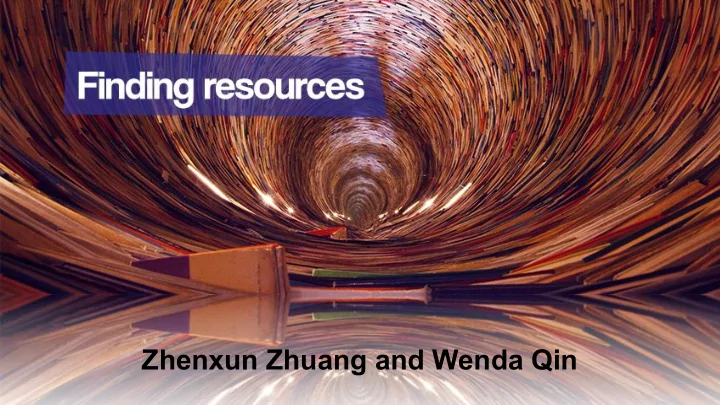

Zhenxun Zhuang and Wenda Qin
Mugar Library for Research… of Computer Science? More than books stored in Mugar Library ( http://library.bu.edu/c.php?g=528928&p=3617399 ) ● Collections: monographs, periodicals… ● Databases: ACM Digital Library, IEEE Xplore ● eJournals and eNewspaper: NY Times ● eBooks: Safari Books Online, Wiley Online Library ● OpenBU: documents and publications authored or co-authored by BU faculty, students, and staff ● * VPN from BU TechWeb
Mugar Library for Research… of Computer Science? Tools and Services ● InterLibrary Borrowing ● In person borrowing from BC, NEU, and Brandeis ● WorldCat: the world's largest library catalog helping find library materials online ● Reference Librarians: help select a database, or find info and resources ● Data Management: helps manage data for a research project, an entire lab... ● Digital Scholarship Services: OpenBU, My CV ● Course materials searching and reserving ● BU Common @ Mugar: the University’s largest computer lab ● Resources for international students: news from home, books in mother language
Science and Engineering Library Offers reference assistance, group instruction, and access —by request—to early volumes of leading journals. Photocopy: $0.10 per, Bookscan: free!
Online Materials: Credibility - Paper from authentic sources - Github - Blog posts - Wikipedia - Lecture notes from other universities and classes - Stackoverflow, quora - Online courses like Coursera, Udacity, or videos from Youtube. - etc.
“Contributions come from diverse demographic and ethnographic segments: ● Mid-20s males and retired males - are the largest demographics [ citation needed ] ● Students (e.g., in the context of a course) ● Enthusiasts (e.g., people with interest in a particular subject, like butterflies) ● Scholars (e.g., researchers who want to use Wikipedia as an additional dissemination platform) ● ... ● Marketers (e.g., individuals, staff, members, or a PR firm seeking to promote a product, service or brand) ● Evildoers (e.g., spammers, vandals).” How to convince yourself, that something from the Internet is “correct”, or helpful? If you are asked to sort these sources in the order of credibility, how you will choose? For different purpose? (References for paper, coding, math problem...)
Greater Research Community - Conference and workshop - Is workshops worth sending paper to? - How to get the most from a huge conference like NeurIPS, CVPR? - Visiting scholar and Seminar: - Are they truly helpful? What kind of seminar will you go? Why? - How to maximize the benefit we can obtain from seminar? - Demo? Lunch? - More than research itself: building network in the research community - How important is it? - What should we do? - Internship - SDE vs Research - Best time to do it
Resources in BU for CS research: library facilities, seminar Credibility from online resources Research Community: how to benefit from the community. The era of conducting research completely alone has passed, for better or worse. Nowadays one has to reach out to the great research community outside to catch up with the cutting-edge work, find collaborations, search for resources.
Recommend
More recommend